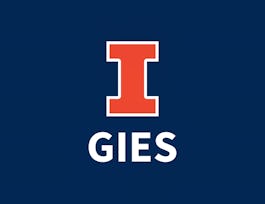In this course, you will learn about a well-researched tool for building a more equitable economy: “employee ownership.” You will learn what it is, how it differs from traditional business ownership models, and the forms it can take. You will learn how employee ownership can share wealth and profits with employees--while making businesses more productive. You will learn what the research shows about the benefits of this tool for employees, retiring business owners, and the economy.

Schenken Sie Ihrer Karriere Coursera Plus mit einem Rabatt von $160 , der jährlich abgerechnet wird. Sparen Sie heute.


Empfohlene Erfahrung
Was Sie lernen werden
How businesses can be designed to share ownership and profits with employees.
New options for business succession.
Facts about wealth inequality.
Kompetenzen, die Sie erwerben
- Kategorie: Business Transformation
- Kategorie: Business development
- Kategorie: Entrepreneurship
- Kategorie: Collaboration
- Kategorie: Leadership And Management
Wichtige Details

Zu Ihrem LinkedIn-Profil hinzufügen
9 Aufgaben
Erfahren Sie, wie Mitarbeiter führender Unternehmen gefragte Kompetenzen erwerben.


Erwerben Sie ein Karrierezertifikat.
Fügen Sie diese Qualifikation zur Ihrem LinkedIn-Profil oder Ihrem Lebenslauf hinzu.
Teilen Sie es in den sozialen Medien und in Ihrer Leistungsbeurteilung.

In diesem Kurs gibt es 4 Module
In this course, you will learn about a well-researched tool for building a more equitable economy: “employee ownership.” You will learn what employee ownership is, how it differs from traditional business ownership models, and the forms it can take. You will learn how employee ownership can share wealth and profits with employees--while making businesses more productive. In the first week of the course, you will learn about how businesses are commonly owned. By the end of the first week, you will understand how employee ownership differs from common ownership models...and you will be able to name three relevant economic trends. Find links to more resources by clicking "Download" below the videos in this lesson. Let's get started.
Das ist alles enthalten
12 Videos5 Lektüren3 Aufgaben2 Diskussionsthemen
Next we look more closely at four specific types of employee ownership: the Employee Stock Ownership Plan or ESOP, the worker cooperative, equity compensation, and the employee ownership trust. We will examine how these types of employee ownership work, how they differ from one another, and their prevalence. Then we will dive deep into understanding the historic roots of modern employee ownership. By the end of this module, you will have acquired a basic understanding of four key types of employee ownership. You will be able to visualize how several companies are successfully sharing ownership with employees. And you will understand how some ideas supporting employee ownership and profit-sharing trace back to the earliest founding of the United States, while the cooperative tradition has roots in Black and marginalized community experiences. Throughout this module, we will learn from several different scholars and experts.
Das ist alles enthalten
8 Videos4 Lektüren2 Aufgaben
Scholars have generated an enormous amount of evidence suggesting that employee ownership can strengthen firm performance, survival, and job stability, improve employee economic well-being, and address wealth inequality. In this module, you will learn some of the most important research findings, findings that are relevant to real-world practice. By the end of this module, you will understand several important takeaways from the research.
Das ist alles enthalten
9 Videos3 Lektüren2 Aufgaben
Welcome to the final part of the course. This section introduces basic information about implementing two forms of employee ownership, the ESOP and the worker cooperative. The two company founders who you met earlier will share more about how they adopted employee ownership. Tracy Till is co-founder of a company that became an ESOP. Jarret Schlaff co-founded a worker cooperative. Both will tell you why their business became employee owned, and how they and their colleagues did it. Both will describe important steps in the process and lessons they learned along the way. We have included links to optional, supplemental, instructional resources. By the end of this portion of the course, you will know much more about how one business owner sold the business she co-owned to employees through an ESOP, and how a different organization became a worker cooperative. You will take away a basic understanding of the key steps in the process, knowledge of important questions to ask, and resources for finding more detailed guidance.
Das ist alles enthalten
10 Videos2 Lektüren2 Aufgaben1 peer review1 Diskussionsthema
Empfohlen, wenn Sie sich für Leadership and Management interessieren

University of Toronto

Università Bocconi

Duke University

University of Illinois Urbana-Champaign
Warum entscheiden sich Menschen für Coursera für ihre Karriere?





Neue Karrieremöglichkeiten mit Coursera Plus
Unbegrenzter Zugang zu über 7.000 erstklassigen Kursen, praktischen Projekten und Zertifikatsprogrammen, die Sie auf den Beruf vorbereiten – alles in Ihrem Abonnement enthalten
Bringen Sie Ihre Karriere mit einem Online-Abschluss voran.
Erwerben Sie einen Abschluss von erstklassigen Universitäten – 100 % online
Schließen Sie sich mehr als 3.400 Unternehmen in aller Welt an, die sich für Coursera for Business entschieden haben.
Schulen Sie Ihre Mitarbeiter*innen, um sich in der digitalen Wirtschaft zu behaupten.
Häufig gestellte Fragen
Access to lectures and assignments depends on your type of enrollment. If you take a course in audit mode, you will be able to see most course materials for free. To access graded assignments and to earn a Certificate, you will need to purchase the Certificate experience, during or after your audit. If you don't see the audit option:
The course may not offer an audit option. You can try a Free Trial instead, or apply for Financial Aid.
The course may offer 'Full Course, No Certificate' instead. This option lets you see all course materials, submit required assessments, and get a final grade. This also means that you will not be able to purchase a Certificate experience.
When you purchase a Certificate you get access to all course materials, including graded assignments. Upon completing the course, your electronic Certificate will be added to your Accomplishments page - from there, you can print your Certificate or add it to your LinkedIn profile. If you only want to read and view the course content, you can audit the course for free.
You will be eligible for a full refund until two weeks after your payment date, or (for courses that have just launched) until two weeks after the first session of the course begins, whichever is later. You cannot receive a refund once you’ve earned a Course Certificate, even if you complete the course within the two-week refund period. See our full refund policy.

 enthalten
enthalten
